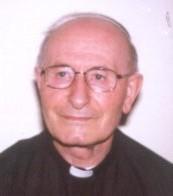Daniel Comboni
Comboni Missionaries
Institutional area
Other links
Newsletter
In Pace Christi
Franzini Antonio
Fr. Antonio Franzini was born on 16 March 1933 at Grosio, in the province of Sondrio, the only boy in a family of six children. In Autumn 1953, he entered Gozzano novitiate. A few months previously, the Parish priest of Ravoledo di Grosio had written a letter giving some information regarding “the seminarian Franzini Antonio, a member of my parish, who wishes to enter the Comboni Institute”, asking for prayers that the Lord “should raise up more vocations in my parish, since this seminarian is one of the first after more than 200 years”!
Fr. Antonio took temporary vows on 9 September 1955, was ordained priest on 31 May 1958 and took final vows on 19 March 1959.
He spent his first four years of priesthood in Italy, firstly in Riccione and then in the apostolic schools of Carraia and Rebbio.
In October 1962 he was assigned to Northern Uganda. Up to the end of 1966 he worked among the Madi, a Nilotic tribe, bordering on Acholi territory along the banks of the Nile, a stony place full of monkeys and mosquitoes. The Madi language is difficult to learn but “after just a month in the mission – Fr. Antonio wrote as he recalled those years in the article he wrote for his priestly Golden Jubilee – I was able to accompany the catechist to the villages and write my first homilies … knowing very little English I had to speak Madi and the people forgave my mistakes since I was a ‘guest’ ”. At Pakele he was welcomed by the parish priests Fr. Antonio Spugnardi, a man who was open and optimistic and those were “two wonderful years”. The pastoral area of East Madi was vast. Fr. Antonio would go on safari on his bicycle or by motorcycle, followed by the bearers. “Due to the isolation of the people who lived far from the roads and inhabited centres, the children were growing up without being instructed or baptised. The passing missionary would rectify a few things but then, after he had gone, they were alone again. The Madi converted as a whole to Catholicism and, even though they were slow to attend the prayers and receive the sacraments, they were proud to be Catholics. From time to time the Moslems would tempt them with shoes and blankets. The Madi would take the gifts but never changed their religion. The Madi also had their first priests who were quite faithful and zealous. In Gulu we also had the first African Sisters who did a world of good work”.
From 1967 to 1974, Fr. Antonio worked among the mountain Alur, a very hospitable people. He settled in well both regarding the climate and the apostolate, “because the catechists were zealous, even if somewhat elderly”.
At Easter 1969, he returned to Italy for his first holidays and in 1970 did the Comboni Renewal Course in Rome. Early in 1974 he returned among the Madi and worked at Adjumani, helping Fr. Eugenio Caligari, who was then the only missionary in the whole of East Madi. “For me it was a fruitful and beautiful time, due to our perfect mutual understanding. Fr. Caligari was a man with a broad vision and was always very generous and optimistic”.
After two years he returned among the Alur and then, at Easter 1980, he returned to Italy and stayed in Rebbio as animator up to the end of December 1985. He spent a short period in Uganda but returned to Italy in July 1987. Starting in June of the following year he worked at Thiene as bursar. In 1996 he was assigned to San Tomìo where he remained until 2009, devoting himself to ministry, especially Eucharistic adoration and confessions.
Fr. Antonio spent from 2009 to 2017 in Rebbio, being treated for various health problems. In 2018 he was moved to the CAA in Milan where he died on Christmas Day 2019.
Da Mccj Bulletin n. 282 Suppl. In Memoriam, gennaio 2020 pp. 140-144.

